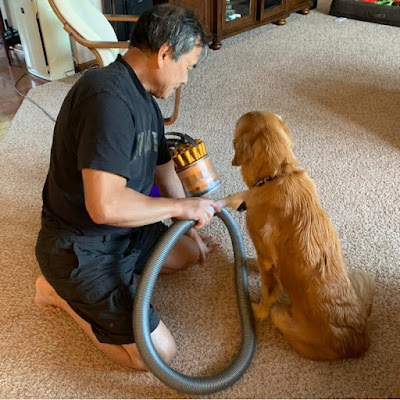Answer #1: First, and most importantly, vacuuming is still Ren’s life source. Or should I say life force?! I guess it’s probably both. The kids know if dad is vacuuming, all is well with the world, and if he’s not, well, something’s off. Some of you may call that an obsession. I call it the world’s easiest way to know if your spouse is feeling ok physically and mentally. And, I can tell you, Ren is feeling fine!
I’m not sure how SHIRO feels about Ren’s vacuuming habit, but I’ve got to admit, I’m a huge fan of the reduction in dog hair around the house. Given the fact that she dutifully comes and lies down next to him when he grabs the vacuum and the bag of dog treats, I’ve got to believe she doesn’t mind it too much!
Have I ever told you how good Ren is at getting animals to do what he wants them to do? Are we the only family with a cat that knows how to beg for food?
 |
| X-ray from Ren’s 2-year follow up appointment |
Answer #3: Ren’s playbook of luuuuv, a lifelong go-to source. How do I know he loves me? He makes my tea and picks up the dog poop. When it comes to words, though, his skills are less developed. I’ve been working on a translation guide:
Standard Japanese / Ren’s Japanese
Hello? (On the phone) / uhnI read somewhere that the average number of words exchanged between a married Japanese couple in a day is well below 100 words. I don’t know if that’s true, and I can’t remember the exact number. I just remember thinking it was shockingly low. But then I started noticing how many words Ren actually says in a day. Many people say that a healthy relationship in Japan is one that requires few words. Lucky for us, then!!
Welcome home (when I get home from work) / uhn
How was your day? / (silence)
Yes. (In response to a question, even if it’s not a yes-no question) / uhn





